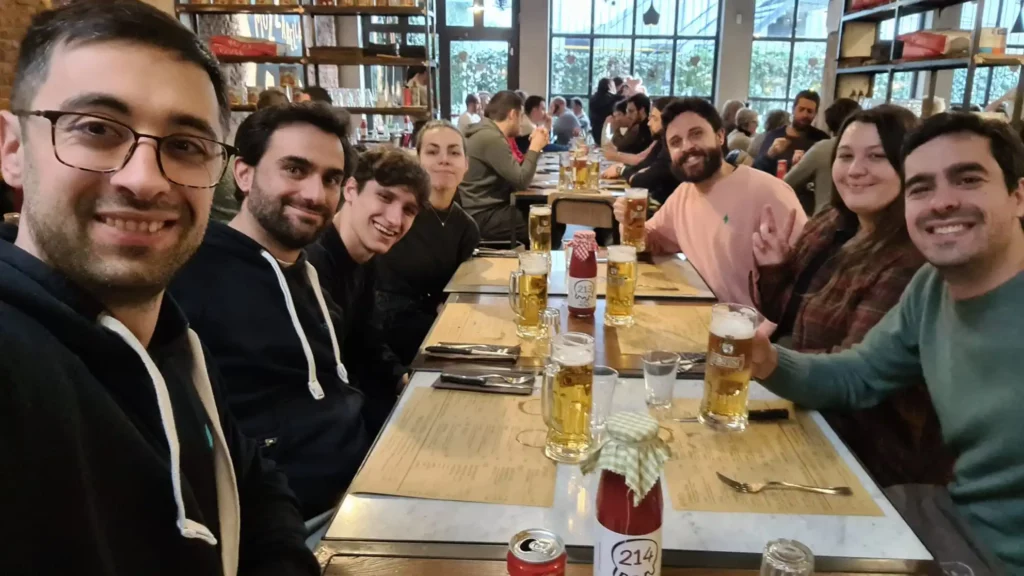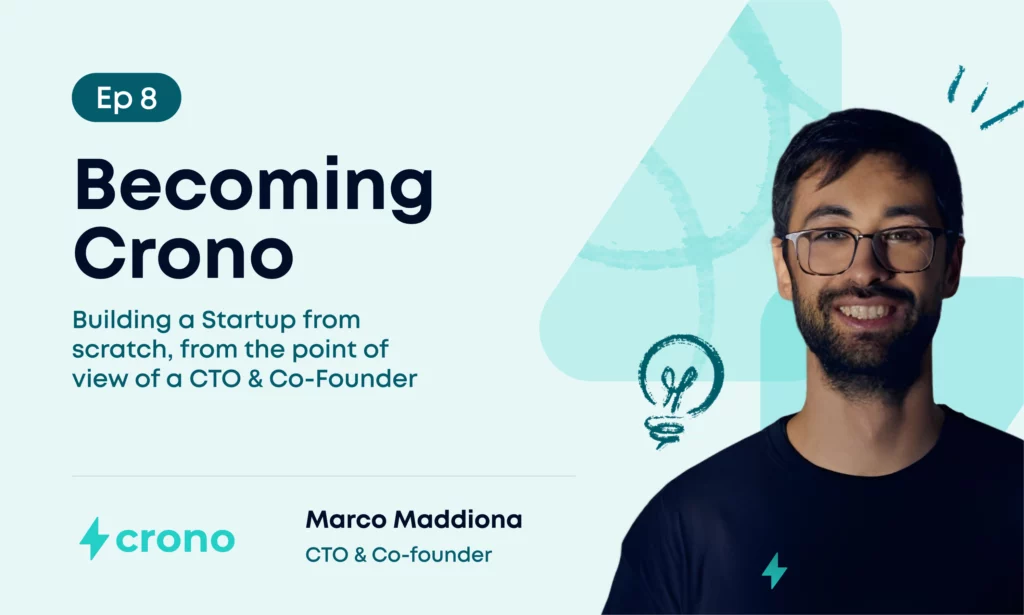Building a startup from an idea can be an exciting adventure that tests resilience, passion, and commitment. It’s about creating something entirely new and adopting the right mindset to turn it into a successful reality.
With “Becoming Crono” we’ll revisit our starting point through an honest and captivating memoir written by our CTO, Marco Maddiona.
Each month, you’ll have the opportunity to witness firsthand the steps that propelled Crono into a startup with a €500,000 pre-seed investment. This will encompass the obstacles we overcame and the choices we made. Have you ever wondered what it’s like to develop software while building a business?
If you are already on board then, enjoy our new episode of Becoming Crono!
Episode 8 - Breaking Records and Looking Ahead
Hi Croners, I’m Marco Maddiona, CTO & Co-Founder of Crono, welcome back! In case you have missed the previous episodes head here to read the very start of our adventure. Now, let’s dive right into our story!
Tracing the roadmap for 2024
Embracing enthusiasm, November became Crono’s highest turnover month, up to that time, propelling the company forward. This achievement not only fueled motivation but also validated the hard work invested in the product.
Efforts began to pay off, and the company even attracted clients from larger competitors. However, staying complacent was not an option in the industry.
The end of the year was used to outline the development roadmap for 2024.
December, typically a slow business month, saw us maintaining November’s momentum. The Christmas period allowed us to recharge, reflect, and plan for the future. This time allowed us to step back from the daily grind and evaluate our progress as a team.
We analyzed our achievements and challenges, refining our strategies and setting goals for the upcoming year. It was a moment to celebrate milestones and acknowledge the hard work and dedication that got us there.

We celebrated the year’s end together, cherishing the progress since our MVP launched the previous year. In the fast-paced start-up world, each year felt like an era, and our broad, integrative product reflected that. Our journey from concept to a market-recognized product was remarkable.
Reflecting on our journey, we saw how far we had come. From the early days of our MVP to gaining market traction, our progress was substantial. Our product’s evolution mirrored our growth as a team, adapting to market demands and client needs with agility and resilience.
Balancing Multiple Market Needs
Our platform’s comprehensive coverage of the prospecting process required high standards and numerous functionalities, unlike single-function tools in the commercial sector. This approach demanded significant resources and effort, which we had anticipated.
Gaining industry media coverage and interest from leading start-ups and software companies, including a major fintech company, was a testament to our progress. We were driven by the goal of enhancing our product to meet the needs of such significant clients.
We spent another winter driven by enthusiasm, designing Crono’s future. Despite facing stiff competition, our flexible and configurable software began attracting small to medium-sized companies.
Balancing the needs of different company sizes required diverse go-to-market and sales strategies. While it might have seemed logical to focus on one market, opportunities from larger companies were hard to pass up.
We decided to keep building a product that could fit medium and large-size companies, thanks to a certain degree of flexibility in the product and its maturity in terms of development.
This decision allowed us to solve one of the existential questions while making a product and deciding which target of clients to follow: keeping our vision broad helped us get the attention of both types of companies.
Team Dynamics and Challenges
It’s late January and the year has kicked off incredibly well with 4 new clients who had just raised a Series A round.
So, as usual, I set my 1-1 with the team to align on new goals and understand what’s working and what needs improvement. And that’s when I got important news that also became a challenge.
One of the most experienced members of the team told me that he had found another job and would resign, with two months’ notice.
He had been doing important work since he came to Chrono 6 months earlier, and although he was an already trained developer, I had invested quite a bit of time in imparting to him my knowledge about the project and trying to make him an active and involved part of the team.
I started to think about why he wanted to leave the team and I finally realized a couple of things:
The technology we were using in Crono was not his favourite, nor was the approach given to the project: the fact that he knew the language was not enough to think he was the right person for the team’s needs.
His willingness to do a refactoring of the code before continuing on the development of new features: as a developer, I understand this aspect, but when you work in a startup you don’t have the same amount of time as you do in a consulting firm or a large company.
Working in a loosely structured environment with high dynamism goes poorly with figures who have more experience and an already defined mindset: it is difficult to train someone who already has a lot of experience just as it is difficult to get them to change their habits.
Team lessons
When you build your team, letting someone go is a bit painful but it’s a chance to learn some lessons:
- When building a startup you have to realize early on whether or not a person is a good fit for the environment and type of role. That is what the probationary period is.
Not all employees share the same dream as you. Some do, but not all. Sure, they may admire you for what you are doing and may be committed to you achieving it but whether the startup succeeds or not is not their life’s goal.
- Over the long term, it is more cost-effective to invest in young people who have not yet developed a defined mindset and work habits and who are more willing to learn and get involved. Experienced people are very important in a team, especially a development team, but it is much harder to get them to adapt in an unstructured and dynamic environment such as a startup.
In the meantime, the team didn’t stop, in fact, it expanded.
We brought in a new young member, Oleh (a computer engineering student in Ukraine) who in a very short time, even before he starts working is documenting himself to align with everything about Crono (not only from a technical point of view).
February is progressing and we understand how important it is to focus on management and strategy as well as day-to-day operations. Building startups teaches many things all the time.
New product features
The roadmap we had built at the beginning of the year was tailored to attract a potentially big customer. So in the early months of 2024, we focus on building new features that could fit that kind of company.
Unfortunately, though, the potential customer didn’t buy our solution – in fact, they didn’t buy any – but we discovered something really pleasant.
The features developed to fit larger businesses had impressive success among our clients and led us to get new ones.
We understood that raising the bar of quality to try to convert big customers gives very good spin-offs to small- to medium-sized customers as well, and we continue to navigate in this direction.
Building a startup is like sailing in the ocean. Sometimes the sea is calm and sometimes there is a storm with waves trying to turn the ship upside down.
One must try to keep the bow always straight toward the set direction and keep looking fixedly toward the goal.

